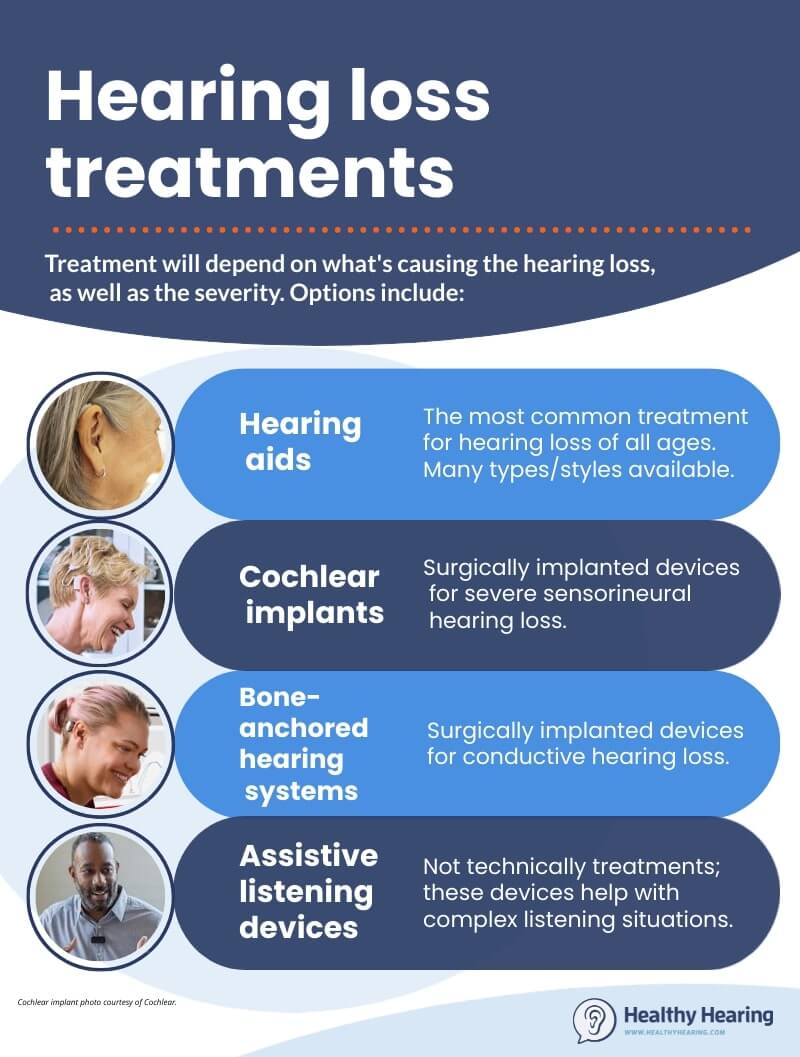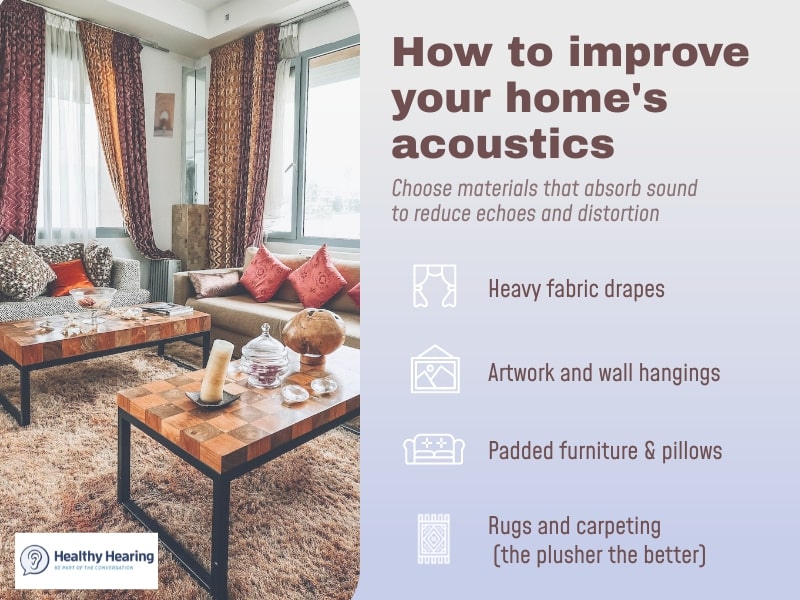|
www.HealthyHearing.com |
Hearing loss treatments
By Joy Victory, managing editor, Healthy Hearing Last updated on: April 15th, 2025 Hearing loss treatments include hearing aids, cochlear implants, medical treatments and other options. Key points:
Hearing loss is one of the most common health conditions facing Americans today. The right treatment depends on a number of factors, such as severity of hearing loss, the underlying cause, type of hearing loss and your lifestyle. If you have trouble hearing, the first step is getting a hearing test and a thorough evaluation from a hearing care professional. Why treat hearing loss?In children, untreated hearing loss negatively impacts language development, learning, and social engagement. In adults, hearing loss makes communication a challenge, severely impacting quality of life.
Treatments for sensorineural hearing lossOne of the most common forms of hearing loss is sensorineural hearing loss, meaning it affects sensory and nerve cells in the inner ear and brain. While it's more common in older adults, anyone can develop this type of hearing loss, particularly if they have a noisy occupation. Sensorineural hearing loss is permanent; hair cells can't be repaired once they're damaged. For people with type of hearing loss, hearing aids are the gold standard treatment. In some cases, cochlear implants may be recommended. Hearing aidsHearing aids do not cure or restore hearing. The basic purpose of a hearing aid is to amplify sound in the specific ranges you need. Today's hearing aids can be highly customized to your hearing needs—amplifying the sounds you need to hear while minimizing those you don't. If your hearing care professional recommends hearing aids, they will work with you to calibrate them to your specific hearing loss, during a process known as fitting. While they can't exactly mimic normal hearing, they work very well for people with mild to moderate hearing loss. Hearing aids can be worn behind the ear or in the ear depending on the degree of hearing loss and personal preference. There are many types and styles. Cochlear implantsFor some people, hearing aids do not provide enough amplification and cochlear implants will be the recommended treatment. Implants require surgery, but they can be an excellent option for people who aren't helped enough by hearing aids. Children, adults and older adults are all potential candidates for cochlear implants. Unlike hearing aids, cochlear implants are generally covered by insurance programs. Treatment for conductive hearing lossThe other main type of hearing loss is known as conductive hearing loss. It's generally caused by a condition in the outer or middle inner and is usually temporary. Conductive hearing loss can be the result of earwax build-up in the ear canal, fluid in the middle ear or a perforated eardrum. Bone-anchored hearing systemsBone-anchored hearing systems are surgically implanted devices that treat hearing loss through bone conduction of sound vibrations to the inner ear. This is in contrast to regular hearing aids, which amplify acoustic sounds that enter the ear canal. Other surgical treatments for hearing lossConductive hearing loss treatment options usually involve medical intervention from an ear-nose-throat specialist to address the specific cause. It usually means that something anatomical is preventing sound from reaching the inner ear, such as otosclerosis. In some cases, surgery might help, particularly if you have a bone or anatomical problem. Assistive listening devicesHearing aids and cochlear implants are a big help, but sometimes they cannot address the very specific needs of every person. In these situations, there are countless accessories and assistive listening devices that can bridge communication gaps. Assistive listening devices (ALDs) can improve your experience while watching television, listening to music or talking on the phone. These include captioned phones, amplified phones, FM systems, TV hearing devices, smartphone apps, and hearing loops that connect with hearing aid telecoils. Treatments for sudden hearing lossSudden hearing loss in one ear should always be treated quickly and requires medication. If you've suddenly lost your hearing, contact your medical provider ASAP as prompt treatment reduces your chances of permanent hearing loss. Auditory training and rehabWhether you are prescribed hearing aids or cochlear implants or another device, auditory training or rehab can help the brain relearn how to process noise into sound. Sometimes these exercises can be completed entirely at home, while others are more intensive, similar to visiting a physical or occupational therapist. Room acoustics matter, too
Yep, your home's acoustics may be bad for your hearing. A few small changes to your home's decor and learning communication tips for public settings can improve your levels of daily frustrations linked to hearing loss. Even if you wear hearing aids, keep in mind that sounds like restaurant background noise are challenging. What if I also have tinnitus?It's not unusual to experience tinnitus when you start to develop hearing loss as you get older. In fact, it can be one of the first signs of hearing loss. Fortunately, today's hearing aids often come with what are known as "tinnitus masking features" to help tune out the ringing in your ears. A host of other tinnitus relief tools are available to you, as well. It's crucial to talk to your hearing care provider about your tinnitus. If you're a veteranHearing loss and tinnitus are two of the top health issues affecting both active military and veterans. In fact, the number one employer of audiologists in the U.S. is the Veterans Administration. If you served in the military, the VA provides hearing care for those who qualify. How to get helpHearing loss is all too common, but there has never been a better time to seek treatment with today's amazing technology and medical options available. If you need help with your hearing, our directory of consumer-reviewed hearing clinics is a good next step. Joy Victory, managing editor, Healthy Hearing
You are reading about: Related topics
More information about hearing aids, hearing aid brands, assistive devices and tinnitus. Featured clinics near me
Earzlink Hearing Care - Reynoldsburg Find a clinicNeed a hearing test but not sure which clinic to choose? Call 1-877-872-7165 for help setting up a hearing test appointment. Related contentThe Healthy Hearing Report |
|
www.HealthyHearing.com |
Hearing loss treatments
By Joy Victory, managing editor, Healthy Hearing Last updated on: April 15th, 2025 Hearing loss treatments include hearing aids, cochlear implants, medical treatments and other options. |





 Joy Victory has extensive experience editing consumer health information. Her training in particular has focused on how to best communicate evidence-based medical guidelines and clinical trial results to the public. She strives to make health content accurate, accessible and engaging to the public.
Joy Victory has extensive experience editing consumer health information. Her training in particular has focused on how to best communicate evidence-based medical guidelines and clinical trial results to the public. She strives to make health content accurate, accessible and engaging to the public.